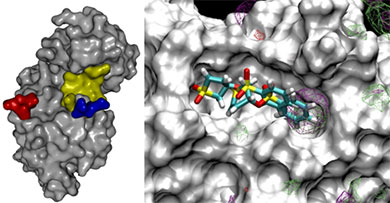The Shapiro Laboratory is developing new approaches to selectively regulate mitogen activated protein (MAP) kinases involved in promoting cancer cell proliferation and tissue injury due to inflammation.
Experimental methods incorporate computational and medicinal chemistry along with structural, molecular, and cell biology to identify new small molecules that target unique MAP kinase docking sites and selectively disrupt interactions with substrate proteins involved in cancer cell proliferation or inflammation.
Current studies use these compounds to dissect the functions of the extracellular signal-regulated kinase (ERK1/2) family of MAP kinases and evaluate whether selective disruption of ERK1/2 functions can improve cancer treatments and prevent off-target toxicity and drug resistance. Additional areas of study are aimed at developing novel approaches to inhibit p38 MAP kinase functions responsible for tissue injury due to inflammation.
Molecular modeling of MAP kinase proteins. Left panel highlights regions (colored) of the kinase that are involved in regulating specific substrate proteins. The right panel shows a model of a new compound interacting with ERK2 at a site that regulates proteins involved in cancer cell proliferation (From Samadani et al. Biochem. J. 2015)

